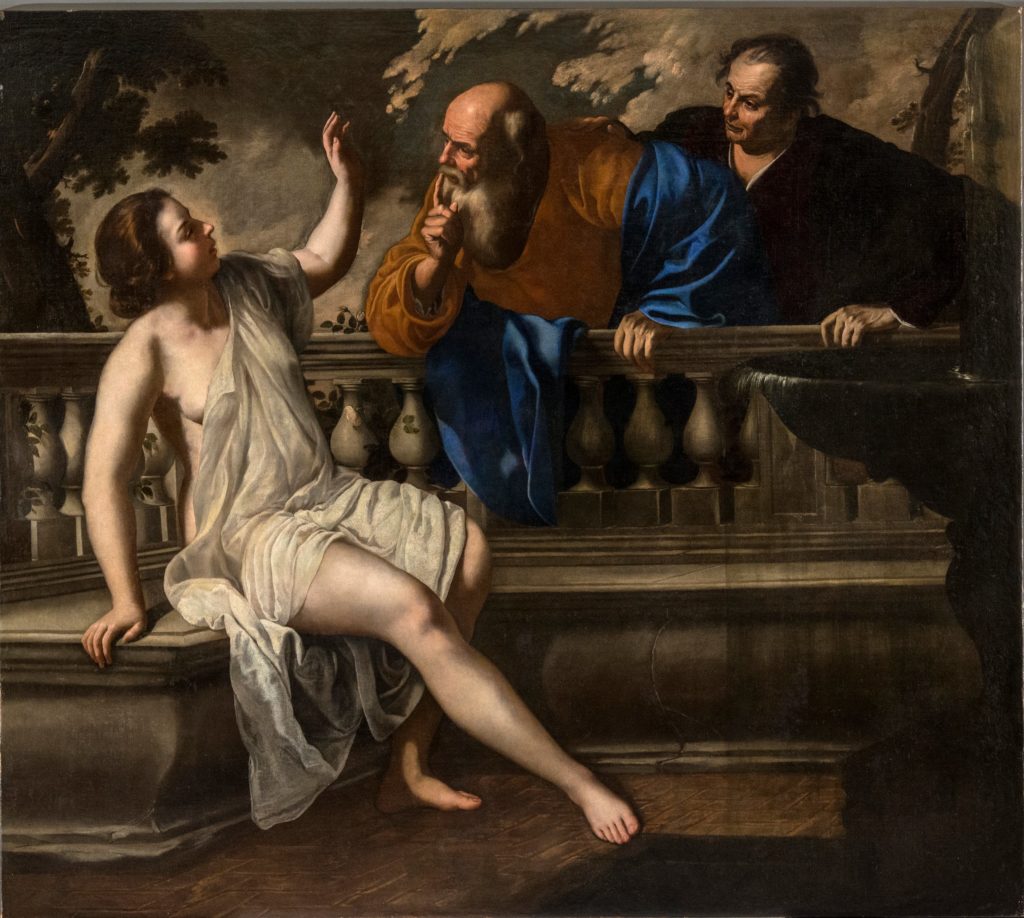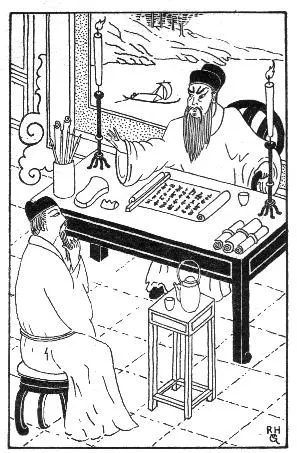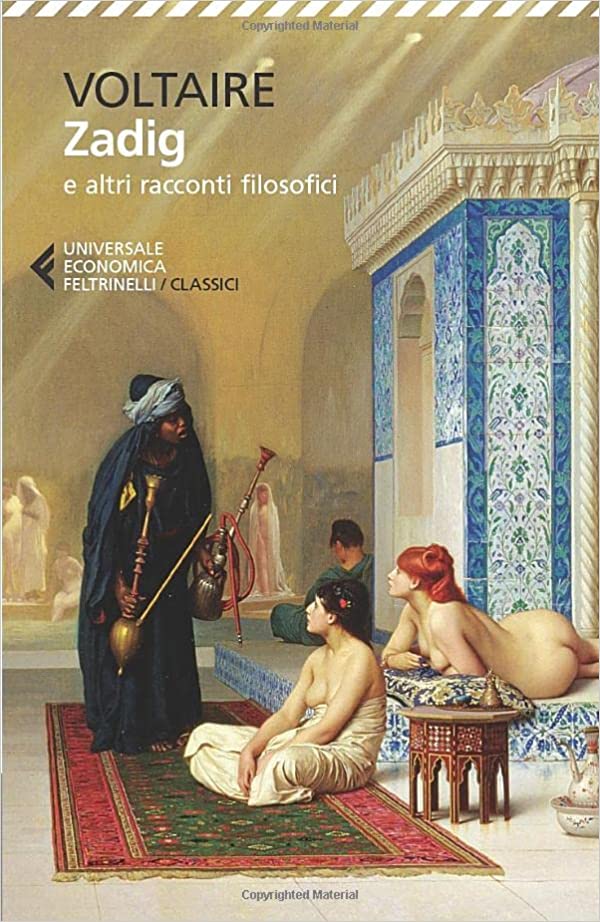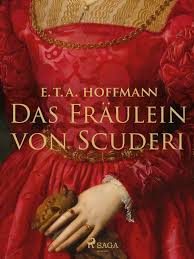This post contains extracts from proto-mysteries, predating Edgar Alan Poe’s Auguste Dupin stories, which popularized the genre. For an analysis of some of these sources (“The Three Princes of Serendip” and Zadig), tied into a history of story-telling and reading, see my essay “The Reading of Mystery and the Mystery of Reading.”
Susanna and the Elders

The Book of Daniel, Chapter 13
As the story goes, a fair Hebrew wife named Susanna was falsely accused by lecherous voyeurs. As she bathes in her garden, having sent her attendants away, two lustful elders secretly observe the lovely Susanna. When she makes her way back to her house, they accost her, threatening to claim that she was meeting a young man in the garden unless she agrees to have sex with them.
She refuses to be blackmailed and is arrested and about to be put to death for promiscuity when a young man named Daniel interrupts the proceedings, shouting that the elders should be questioned to prevent the death of an innocent.
Wikipedia contributors. “Detective fiction.” Wikipedia, The Free Encyclopedia. Wikipedia, The Free Encyclopedia, 1 Oct. 2014. Web. 11 Oct. 2014.
50 Then all the people returned in haste. To Daniel the elders said, “Come, sit with us and inform us, since God has given you the prestige of old age.” 51 But he replied, “Separate these two far from one another, and I will examine them.”
52 After they were separated from each other, he called one of them and said: “How you have grown evil with age! Now have your past sins come to term: 53 passing unjust sentences, condemning the innocent, and freeing the guilty, although the Lord says, ‘The innocent and the just you shall not put to death.’ 54 Now, then, if you were a witness, tell me under what tree you saw them together.” 55 “Under a mastic tree,” he answered. “Your fine lie has cost you your head,” said Daniel; “for the angel of God has already received the sentence from God and shall split you in two.” 56 Putting him to one side, he ordered the other one to be brought. “Offspring of Canaan, not of Judah,” Daniel said to him, “beauty has seduced you, lust has perverted your heart. 57 This is how you acted with the daughters of Israel, and in their fear they yielded to you; but a daughter of Judah did not tolerate your lawlessness. 58 Now, then, tell me under what tree you surprised them together.” 59 “Under an oak,” he said. “Your fine lie has cost you also your head,” said Daniel; “for the angel of God waits with a sword to cut you in two so as to destroy you both.”
60 The whole assembly cried aloud, blessing God who saves those who hope in him. 61 They rose up against the two old men, for by their own words Daniel had convicted them of bearing false witness. They condemned them to the fate they had planned for their neighbor: 62 in accordance with the law of Moses they put them to death. Thus was innocent blood spared that day.
63 Hilkiah and his wife praised God for their daughter Susanna, with Joakim her husband and all her relatives, because she was found innocent of any shameful deed. 64 And from that day onward Daniel was greatly esteemed by the people.
Oedipus Rex by Sophocles

Many years ago, at a banquet in Corinth, a man drunkenly accused Oedipus of not being his father’s son. Bothered by the comment Oedipus went to Delphi and asked the oracle about his parentage. Instead of answers he was given a prophecy that he would one day murder his father and sleep with his mother. Upon hearing this he resolved to leave Corinth and never return. While traveling he came to the very crossroads where Laius was killed, and encountered a carriage which attempted to drive him off the road. An argument ensued and Oedipus killed the travelers, including a man who matches Jocasta’s description of Laius. Oedipus has hope, however, because the story is that Laius was murdered by several robbers. If the shepherd confirms that Laius was attacked by many men, then Oedipus is in the clear.
A man arrives from Corinth with the message that Oedipus’s father has died. Oedipus, to the surprise of the messenger, is made ecstatic by this news, for it proves one half of the prophecy false, for now he can never kill his father. However, he still fears that he may somehow commit incest with his mother. The messenger, eager to ease Oedipus’s mind, tells him not to worry, because Merope was not in fact his real mother.
It emerges that this messenger was formerly a shepherd on Mount Cithaeron, and that he was given a baby, which the childless Polybus then adopted. The baby, he says, was given to him by another shepherd from the Laius household, who had been told to get rid of the child. Oedipus asks the chorus if anyone knows who this man was, or where he might be now. They respond that he is the same shepherd who was witness to the murder of Laius, and whom Oedipus had already sent for. Jocasta, who has by now realized the truth, desperately begs Oedipus to stop asking questions, but he refuses and Jocasta runs into the palace.
Wikipedia contributors. “Oedipus the King.” Wikipedia, The Free Encyclopedia. Wikipedia, The Free Encyclopedia, 9 Oct. 2014. Web. 14 Oct. 2014.
OEDIPUS [looking out away from the palace]: You elders, although I’ve never seen the man / we’ve been seeking for a long time now, / if I had to guess, I think I see him. / He’s coming here. He looks very old— / as is appropriate, if he’s the one. / And I know the people coming with him, / servants of mine. But if you’ve seen him before, / you’ll recognize him better than I will.
CHORUS LEADER: Yes, I recognize the man. There’s no doubt. / He worked for Laius—a trusty shepherd.
[Enter SERVANT, an old shepherd]
OEDIPUS: Stranger from Corinth, let me first ask you— / is this the man you mentioned?
MESSENGER: Yes, he is— / he’s the man you see in front of you.
OEDIPUS: You, old man, over here. Look at me. / Now answer what I ask. Some time ago / did you work for Laius?
SERVANT: Yes, as a slave. / But I was not bought. I grew up in his house.
OEDIPUS: How did you live? What was the work you did?
SERVANT: Most of my life I’ve spent looking after sheep.
OEDIPUS: Where? In what particular areas?
SERVANT: On Cithaeron or the neighbouring lands. 1350
OEDIPUS: Do you know if you came across this man / anywhere up there?
SERVANT: Doing what? / What man do you mean?
OEDIPUS: The man over here– / this one. Have you ever run into him?
SERVANT: Right now I can’t say I remember him.
MESSENGER: My lord, that’s surely not surprising. / Let me refresh his failing memory. / I think he will remember all too well / the time we spent around Cithaeron. / He had two flocks of sheep and I had one. / I was with him there for six months at a stretch, / from early spring until the autumn season. / In winter I’d drive my sheep down to my folds, / and he’d take his to pens that Laius owned. / Isn’t that what happened—what I’ve just said?
SERVANT: You spoke the truth. But it was long ago.
MESSENGER: All right, then. Now, tell me if you recall / how you gave me a child, an infant boy, / for me to raise as my own foster son.
SERVANT: What? Why ask about that?
MESSENGER: This man here, my friend, / was that young child back then.
SERVANT: Damn you! / Can’t you keep quiet about it!
OEDIPUS :Hold on, old man. / Don’t criticize him. What you have said / is more objectionable than his account.
SERVANT: My noble master, what have I done wrong?
OEDIPUS: You did not tell us of that infant boy, / the one he asked about.
SERVANT: That’s what he says, / but he knows nothing—a useless busybody.
OEDIPUS: If you won’t tell us of your own free will, / once we start to hurt you, you will talk. 1380
SERVANT: By all the gods, don’t torture an old man!
OEDIPUS: One of you there, tie up this fellow’s hands.
SERVANT: Why are you doing this? It’s too much for me! / What is it you want to know?
OEDIPUS: That child he mentioned— / did you give it to him?
SERVANT: I did. How I wish / I’d died that day!
OEDIPUS: Well, you are going to die / if you don’t speak the truth.
SERVANT: And if I do, / there’s an even greater chance that I’ll be killed.
OEDIPUS: It seems to me the man is trying to stall.
SERVANT: No, no, I’m not. I’ve already told you— / I did give him the child.
OEDIPUS: Where did you get it? / Did it come from your home or somewhere else?
SERVANT: It was not mine—I got it from someone.
OEDIPUS: Which of our citizens? Whose home was it?
SERVANT: In the name of the gods, my lord, don’t ask! / Please, no more questions!
OEDIPUS: If I have to ask again, / then you will die.
SERVANT: The child was born in Laius’ house.
OEDIPUS: From a slave or from some relative of his?
SERVANT: Alas, what I’m about to say now . . . / it’s horrible.
OEDIPUS: And I’m about to hear it. / But nonetheless I have to know this.
SERVANT: If you must know, they said the child was his. / But your wife inside the palace is the one / who could best tell you what was going on.
OEDIPUS: You mean she gave the child to you?
SERVANT: Yes, my lord.
OEDIPUS: Why did she do that?
SERVANT: So I would kill it.
OEDIPUS: That wretched woman was the mother?
SERVANT: Yes. / She was afraid of dreadful prophecies.
OEDIPUS: What sort of prophecies?
SERVANT: The story went / that he would kill his father.
OEDIPUS: If that was true, / why did you give the child to this old man?
SERVANT: I pitied the boy, master, and I thought / he’d take the child off to a foreign land / where he was from. But he rescued him, / only to save him for the greatest grief of all. / For if you’re the one this man says you are / you know your birth carried an awful fate.
OEDIPUS: Ah, so it all came true. It’s so clear now. / O light, let me look at you one final time, / a man who stands revealed as cursed by birth, / cursed by my own family, and cursed / by murder where I should not kill.
[OEDIPUS moves into the palace]
Gong’An Fiction

Gong’an or crime-case fiction (Chinese: 公案小说) is a subgenre of Chinese crime fiction involving government magistrates who solve criminal cases. The Judge Dee and Judge Bao stories are the best known examples of the genre.
Celebrated Cases of Judge Dee
There are three cases in this book. The first might be called “The Double Murder at Dawn”; the case describes the hazardous life of the traveling silk merchant and a murder which is committed to gain wealth.
The second, “The Strange Corpse”, takes place in a small village and addresses a crime of passion which proves hard to solve. The criminal is a very determined woman.
The third case, “The Poisoned Bride”, addresses the murder of a local scholar’s daughter, who marries the son of the former administrator of the district. This case contains a surprising twist in its solution.
All three cases are solved by Judge Dee, the district magistrate, detective, prosecutor, judge, and jury all wrapped up into one person.
Wikipedia contributors. “Celebrated Cases of Judge Dee.” Wikipedia, The Free Encyclopedia. Wikipedia, The Free Encyclopedia, 2 Jan. 2014. Web. 14 Oct. 2014.
The Three Princes of Serendip

The Three Princes of Serendip is the English version of the Peregrinaggio di tre giovani figliuoli del re di Serendippo published by Michele Tramezzino in Venice in 1557. Tramezzino claimed to have heard the story from one Christophero Armeno who had translated the Persian fairy tale into Italian adapting Book One of Amir Khusrau’s Hasht Bihisht of 1302. The story first came to English via a French translation, and now exists in several out-of-print translations. Serendip is the Persian and Urdu name for Sri Lanka, which was adopted from Tamil “Seren deevu” or originally from Sanskrit Suvarnadweepa or golden island. In contrast, some trace the etymology to Simhaladvipa which literally translates to “Dwelling-Place-of-Lions Island.”
“In ancient times there existed in the country of Serendippo, in the Far East, a great and powerful king by the name of Giaffer. He had three sons who were very dear to him. And being a good father and very concerned about their education, he decided that he had to leave them endowed not only with great power, but also with all kinds of virtues of which princes are particularly in need.”
So begins the fascinating story of The Three Princes of Serendip. In order to provide the best tutors for his sons, the king travels throughout the island until he finds a number of scholars, each specialized in a different field, “And to them he entrusted the training of his sons, with the understanding that the best they could do for him was to teach them in such a way that they could be immediately recognized as his very own.”
As the three princes are endowed with great intelligence, they soon become highly trained in the arts and sciences. However, when the tutors inform the king of his sons’ achievements, he is sceptical. So he summons his eldest son and announces that he wishes to retire to a monastery and that his son should succeed him as ruler. The eldest son politely refuses, insisting that his father is wiser and should reign until his death. The two younger sons also refuse when commanded in a similar manner.
Although the king is astonished by the wisdom displayed by his sons, he decides to send them on a prolonged journey so that they can acquire empirical experience. He summons his sons and, giving the impression of being angry and disappointed because they have all disobeyed him, banishes them from Serendip. “Thus they started their peregrination and moved out of his kingdom until they reached the kingdom of a great and powerful emperor, whose name was Beramo.”
Misfortune befalls the princes when a camel driver stops them on the road and asks them if they have seen one of his camels. Although they have not, they have noticed signs that suggest a camel has passed along the road. Ever ready to dazzle with their wit and sagacity, the princes mystify the camel driver by asking him if the lost camel is blind in one eye, missing a tooth and lame. The camel driver, impressed by the accuracy of the description, immediately hurries off in pursuit of the animal.
After a fruitless search, and feeling deceived, he returns to the princes, who reassure him by supplying further information. The camel, they say, carried a load of butter on one side and honey on the other, and was ridden by a pregnant woman. Concluding that the princes have stolen the camel, the driver has them imprisoned. It is only after the driver’s neighbour finds the camel that they are released.
The princes are brought before Emperor Beramo, who asks them how they could give such an accurate description of a camel they had never seen. It is clear from the princes’ reply that they had brilliantly interpreted the scant evidence observed along the road.
As the grass had been eaten on one side of the road where it was less verdant, the princes deduced that the camel was blind to the other side. Because there were lumps of chewed grass on the road the size of a camel’s tooth, presumably they had fallen through the gap left by a missing tooth. The tracks showed the prints of only three feet, the fourth being dragged, indicating that the animal was lame. That butter was carried on one side of the camel and honey on the other was clear because ants had been attracted to melted butter on one side of the road and flies to spilled honey on the other.
The deduction regarding the pregnant rider is more complicated than the rest and is somewhat lewd, so I shall let the princes tell it themselves: “I guessed that the camel must have carried a woman,” said the second brother, “because I had noticed that near the tracks where the animal had knelt down the imprint of a foot was visible. Because some urine was near by, I wet my fingers (in it) and as a reaction to its odour I felt a sort of carnal concupiscence, which convinced me that the imprint was of a woman’s foot.”
“I guessed that the same woman must have been pregnant,” said the third, “because I had noticed nearby handprints which were indicative that the woman, being pregnant, had helped herself up with her hands while urinating.”
Boyle, Richard. “The Three Princes of Serendip.” The Living Heritage, 2000: n. pag. Web. 15 November 2009.
From Zadig by Voltaire

One Day, as he was taking a solitary Walk by the Side of a Thicket, he espy’d one of the Queen’s Eunuchs, with several of his Attendants, coming towards him, hunting about, in deep Concern, both here and there, like Persons almost in Despair, and seeking, with Impatience, for something lost of the utmost Importance. Young Man, said the Queen’s chief Eunuch, have not you seen, pray, her Majesty’s Dog? Zadig very cooly replied, you mean her Bitch, I presume. You say very right Sir, said the Eunuch, ’tis a Spaniel-Bitch indeed.–And very small said Zadig: She has had Puppies too lately; she’s a little lame with her left Fore-foot, and has long Ears. By your exact Description, Sir, you must doubtless have seen her, said the Eunuch, almost out of Breath. But I have not Sir, notwithstanding, neither did I know, but by you, that the Queen ever had such a favourite Bitch.
Just at this critical Juncture, so various are the Turns of Fortune’s Wheel! the best Palfrey in all the King’s Stable had broke loose from the Groom, and got upon the Plains of Babylon. The Head Huntsman with all his inferior Officers, were in Pursuit after him, with as much Concern, as the Eunuch about the Bitch. The Head Huntsman address’d himself to Zadig and ask’d him, whether he hadn’t seen the King’s Palfrey run by him. No Horse, said Zadig, ever gallop’d smoother; he is about five Foot high, his Hoofs are very small; his Tail is about three Foot six Inches long; the studs of his Bit are of pure Gold, about 23 Carats; and his Shoes are of Silver, about Eleven penny Weight a-piece. What Course did he take, pray, Sir? Whereabouts is he, said the Huntsman? I never sat Eyes on him, reply’d Zadig, not I, neither did I ever hear before now, that his Majesty had such a Palfrey.
The Head Huntsman, as well as the Head Eunuch, upon his answering their Interrogatories so very exactly, not doubting in the least, but that Zadig had clandestinely convey’d both the Bitch and the Horse away, secur’d him, and carried him before the grand Desterham, who condemn’d him to the Knout, and to be confin’d for Life in some remote and lonely Part of Siberia. No sooner had the Sentence been pronounc’d, but the Horse and Bitch were both found. The Judges were in some Perplexity in this odd Affair, and yet thought it absolutely necessary, as the Man was innocent, to recal their Decree. However, they laid a Fine upon him of Four Hundred Ounces of Gold, for his false Declaration of his not having seen, what doubtless he did: And the Fine was order’d to be deposited in Court accordingly: On the Payment whereof, he was permitted to bring his Cause on to a Hearing before the grand Desterham.
On the Day appointed for that Purpose he open’d the Cause himself, in Terms to this or the like Effect.
Ye bright Stars of Justice, ye profound Abyss of universal Knowledge, ye Mirrors of Equity, who have in you the Solidity of Lead, the Hardness of Steel, the Lustre of a Diamond, and the Resemblance of the purest Gold! Since ye have condescended so far, as to admit of my Address to this August Assembly, I here, in the most solemn Manner, swear to you by Orosmades, that I never saw the Queen’s illustrious Bitch, nor the sacred Palfrey of the King of Kings. I’ll be ingenuous, however, and declare the Truth, and nothing but the Truth. As I was walking by the Thicket’s Side, where I met with her Majesty’s most venerable chief Eunuch, and the King’s most illustrious chief Huntsman, I perceiv’d upon the Sand the Footsteps of an Animal, and I easily inferr’d that it must be a little one. The several small, tho’ long Ridges of Land between the Footsteps of the Creature, gave me just Grounds to imagine it was a Bitch whose Teats hung down; and for that Reason, I concluded she had but lately pupp’d. As I observ’d likewise some other Traces, in some Degree different, which seem’d to have graz’d all the Way upon the Surface of the Sand, on the Side of the fore-Feet, I knew well enough she must have had long Ears. And forasmuch as I discern’d;
with some Degree of Curiosity, that the Sand was everywhere less hollow’d by one Foot in particular, than by the other three, I conceiv’d that the Bitch of our most august Queen was somewhat lamish, if I may presume to say so.
As to the Palfrey of the King of Kings, give me leave to inform you, that as I was walking down the Lane by the Thicket-side, I took particular Notice of the Prints made upon the Sand by a Horse’s Shoes; and found that their Distances were in exact Proportion; from that Observation, I concluded the Palfrey gallop’d well. In the next Place, the Dust of some Trees in a narrow Lane, which was but seven Foot broad, was here and there swept off, both on the Right and on the Left, about three Feet and six Inches from the Middle of the Road. For which Reason I pronounc’d the Tail of the Palfrey to be three Foot and a half long, with which he had whisk’d off the Dust on both Sides as he ran along. Again, I perceiv’d under the Trees, which form’d a Kind of Bower of five Feet high, some Leaves that had been lately fallen on the Ground, and I was sensible the Horse must have shook them off; from whence I conjectur’d he was five Foot high. As to the Bits of his Bridle, I knew they must be of Gold, and of the Value I mention’d; for he had rubb’d the Studs upon a certain Stone, which I knew to be a Touch-stone, by an Experiment that I had made of it. To conclude, by the Prints which his Shoes had left of some Flint-Stones of another Nature, I concluded his Shoes were Silver, and of eleven penny Weight Fineness, as I before mention’d.
The whole Bench of Judges stood astonish’d at the Profundity of Zadig’s nice Discernment. The News was soon carried to the King and the Queen. Zadig was not only the whole Subject of the Court’s Conversation; but his Name was mention’d with the utmost Veneration in the King’s Chambers, and his Privy-Council. And notwithstanding several of their Magi declar’d he ought to be burnt for a Sorcerer; yet the King thought proper, that the Fine he had deposited in Court, should be peremptorily restor’d. The Clerk of the Court, the Tipstaffs, and other petty Officers, waited on him in their proper Habit, in order to refund the four Hundred Ounces of Gold, pursuant to the King’s express Order; modestly reserving only three Hundred and ninety Ounces, part thereof, to defray the Fees of the Court. And the Domesticks swarm’d about him likewise, in Hopes of some small Consideration.
Zadig, upon winding up of the Bottom, was fully convinc’d, that it was very dangerous to be over-wise; and was determin’d to set a Watch before the Door of his Lips for the future.
Voltaire. Zadig. London: John Brindley Bookseller, 1749. The Project Gutenberg. Web. 15 November 2009.
“Das Fräulein von Scuderi” by E. T. A. Hoffman

“Das Fräulein von Scuderi”, an 1819 short story by E. T. A. Hoffmann, in which Mlle de Scudery establishes the innocence of the police’s favorite suspect in the murder of a jeweller, is sometimes cited as the first detective story and a direct influence on Edgar Allan Poe’s “The Murders in the Rue Morgue”.
Wikipedia contributors. “Detective fiction.” Wikipedia, The Free Encyclopedia. Wikipedia, The Free Encyclopedia, 1 Oct. 2014. Web. 11 Oct. 2014.